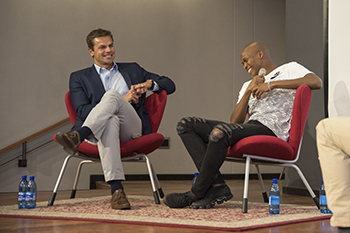Latest News Archive
Please select Category, Year, and then Month to display items
02 January 2025
|
Story Gerda-Marie van Rooyen
|
Photo Supplied
 Leading the research in South Africa is Prof Linus Franke from the Department of Soil, Crop and Climate Sciences.
Leading the research in South Africa is Prof Linus Franke from the Department of Soil, Crop and Climate Sciences.
Scientists are actively pursuing the successful breeding of diploid hybrid potatoes from inbred lines. This is expected to revolutionise potato breeding as it holds the key to rapid genetic progress. It will introduce new varieties for commercialisation through seed. Currently, existing potato variants have a gene that renders self-pollinated seeds infertile.
Prof Linus Franke, an academic in the Department of Soil, Crop and Climate Sciences at the UFS, is leading the research in South Africa. “This technology allows the production of genetically uniform potato seed that is easy to transport and largely disease-free.” He says this differs from conventional breeding whereby only vegetative propagation is possible due to tetraploid varieties in potatoes. It also risks carrying pests and diseases from one generation to the next – leading to the accumulation of pests and diseases with each round of multiplication.
Seed innovation
Prof Franke explains that Solynta BV, a seed company based in the Netherlands that produces potato varieties that can be grown from seed, has included South Africa in their research efforts because it is one of Africa’s largest producers and exporters. Through his academic relationship with Wageningen University and Research, a Dutch institution renowned for its agricultural endeavours and food production, the UFS became involved in researching hybrid potatoes grown from seed.
Diploid seeds containing two sets of chromosomes allow easier gene manipulation to increase predictability and speedier genetic progress. The breeding approach enables the incorporation of tolerance to pests, diseases, abiotic stresses (cold, heat, drought) and other desired genetic traits.
Although Prof Franke is optimistic about this research, he is not blind to disadvantages. “Potato seeds are tiny and have little energy reserves, making it harder to grow potatoes from seed than from tubers.” He says potatoes from seed will take longer to cultivate than tubers, as farmers need to grow plantlets from seeds first, adding six weeks to the growing period. “It is possible that commercial farmers can grow potatoes directly from seed. Alternatively, perhaps more likely, specialised growers will produce tubers of potatoes from seed; these tubers are then sold as seed tubers to other potato farmers, who then continue their normal practices of producing potatoes for the market from tubers.”
Financial benefits
Prof Franke says farmers have reason to get excited. “Seed potatoes will reduce input costs, as varieties with enhanced tolerance to pests and diseases require less pesticides. Planting one hectare of potatoes requires three to four tonnes of potato tubers, but only one 25 g packet of potato seeds.” Since potatoes are a more valuable commodity than maize, this technology might also increase farmers’ income potential.
Luvo and Ryk inspire UFS student leaders
2017-10-13

Ryk Neethling and Luvo Manyonga have a special bond.
The sporting duo shared their inspiring stories with student
Leaders of the University of the Free State.
Photo: Kaleidoscope Studios
Dreams can come true and Luvo Manyonga’s story is the perfect example. It would make the ideal movie script. This is opinion of the businessman and former international swimmer Ryk Neethling.
The Olympic gold medallist and former World Champion and Manyonga shared their stories with new student leaders of the University of the Free State (UFS).
“I am so proud of this guy,” Neethling said. “And we are just half-way through this movie. The best is yet to come.” The 26-year-old Manyonga is the current Olympic silver medallist and World Champion in long jump. But he had to overcome huge obstacles as a former tik or crystal meth addict.
Not an easy road
The duo were guests for a session, Inspirational Stories of Lived Humanising Experiences, which was part of the university’s Student Leadership Training weekend for Student Representative Councils, Residence committees, Residence Assistants and Association Representatives in the Economic and Management Sciences Auditorium on the Bloemfontein Campus.
Manyonga, who is dating the Kovsie netball player Khomotso Mamburu, talked about growing up in Mbekweni township in Paarl, about his career and his setbacks.
After finishing fifth at the IAAF World Championships in Daegu, South Korea, in 2011 he started partying when he returned home. “I hooked up with the wrong friends and they introduced me to tik,” he said. “They told me: ‘Hey dude, you are drunk. Just take a hit and it will sober you up.’ I took it and it was nice, but that is where it started.”
Be surrounded by positive people
Manyonga lost all his money and his sport was also suffering because of his addiction. “At the beginning of 2014 I started to realise that I was throwing my life away and I needed help. I went to reach out to people close to me and told them I had a problem.” He thanked Neethling, who helped him when he was at his lowest, his mother, the South African Sports Confederation and Olympic Committee, Tuks Sport and the High Performance Centre where he trains for the influence on his life.
Neethling’s advice to student leaders was to dream big, work hard, expand your network and find a mentor you can learn from.
“Always surround yourself with positive people,” he said. “You can succeed if you stay positive.”